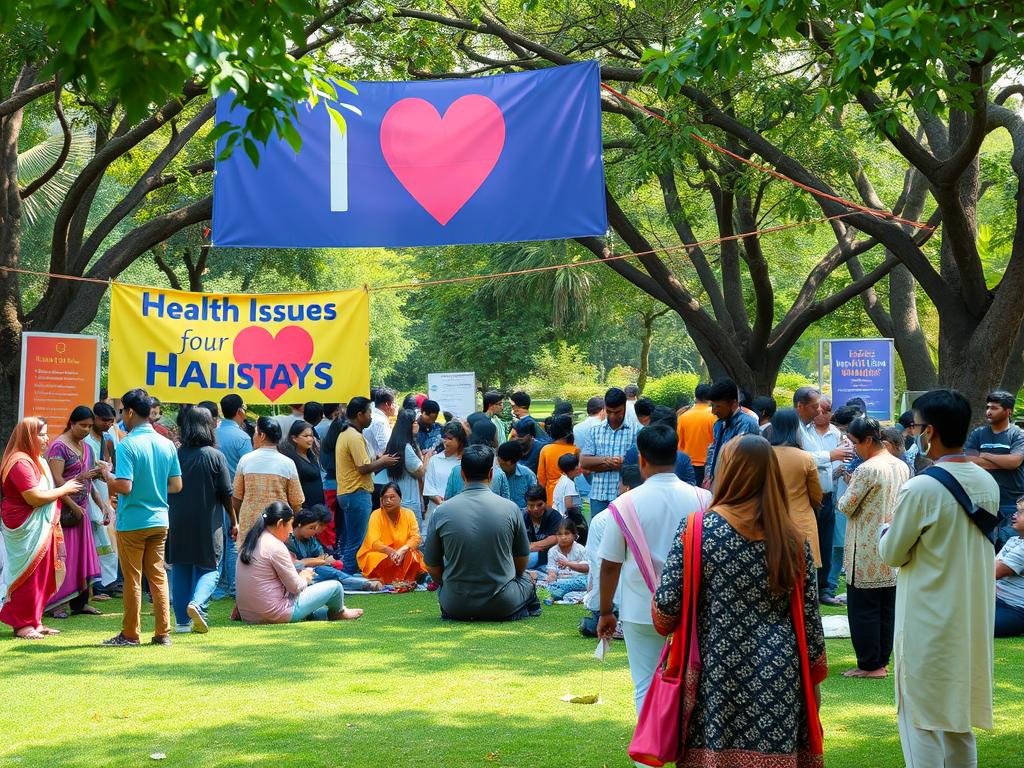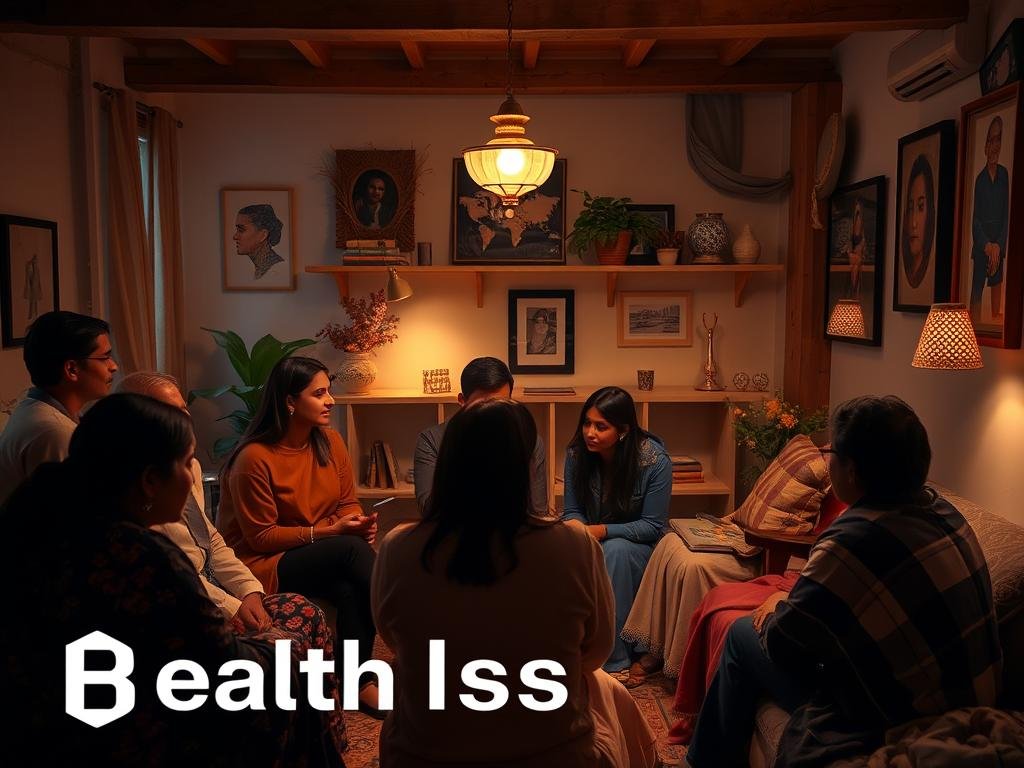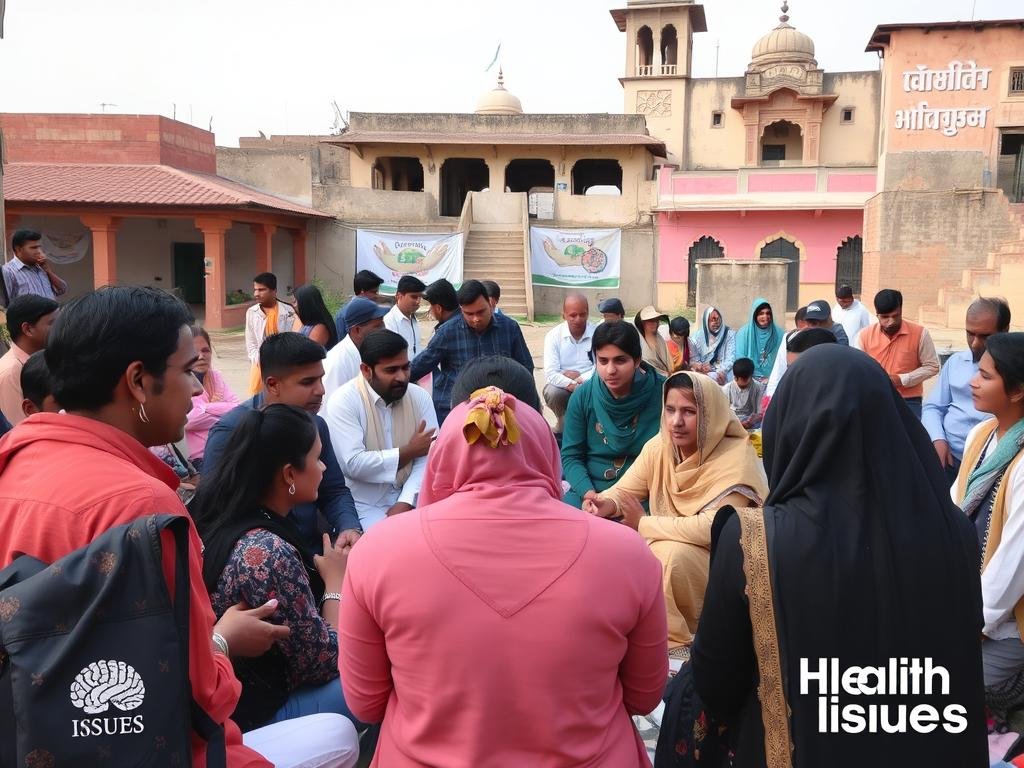In Pakistan, understanding mental health is key. For a long time, wrong ideas and stereotypes have clouded these topics. It’s vital to break the stigma around mental health.
By creating a space where everyone can talk openly, we help those struggling feel accepted. This is the first step towards better mental health awareness Pakistan. It’s about changing how we see mental health and making it a normal topic to discuss.
Key Takeaways
- Mental health is often misunderstood in Pakistan.
- Breaking the stigma is essential for societal acceptance.
- Open discussions about mental health can lead to better support.
- Awareness initiatives can transform public perceptions.
- Community involvement is key to fostering understanding.
Understanding Mental Health in Pakistan
Mental health is key to our well-being and is now recognized in Pakistan. Cultural factors greatly affect how we see mental health. Many struggle with depression, anxiety, and PTSD. We must educate our society about these issues.
The stigma around mental health leads to wrong beliefs. It stops us from talking openly and getting help. We must know that mental health problems affect everyone, no matter their age, gender, or wealth. Working to understand mental health better can help us be kinder to those who suffer.
To better understand mental health in Pakistan, we need educational resources. These can help raise awareness and reduce stigma. Groups like the Pakistan Psychiatric Society offer important information. Working together, we can support and educate more people.
| Mental Health Disorder | Prevalence Rate (%) | Common Symptoms |
|---|---|---|
| Depression | 34% | Low mood, fatigue, lack of interest |
| Anxiety | 23% | Excessive worry, restlessness, insomnia |
| PTSD | 9% | Flashbacks, nightmares, emotional numbness |
Creating an informed community is crucial. By seeing mental health as a vital part of our health system, we can make a difference. This can lead to positive changes in our society.
The Importance of Mental Health Awareness
Mental health awareness is key to our overall well-being. By talking openly about mental health, we can make life better for many. Early help can lead to better results, helping those in need before problems get worse.
In Pakistan, mental health advocacy is very important. Campaigns and community work help break down mental health stigmas. Advocacy brings light to the struggles many face, fostering understanding and kindness.
Studies show that more awareness means a better community. Talking about mental health creates safe spaces for help-seeking. Together, we build a healthier society, supporting each other along the way.
| Benefits of Mental Health Awareness | Impact on Community |
|---|---|
| Promotes early diagnosis | Reduces overall healthcare costs |
| Encourages people to seek help | Improves interpersonal relationships |
| Enhances quality of life | Creates supportive environments |
| Increases knowledge and understanding | Encourages community engagement |
It’s vital to raise our voices for mental health advocacy in Pakistan. We all play a part in this movement. Let’s keep learning and teaching others about the importance of mental health awareness.
Current Mental Health Pakistan’s Statistics
It’s important to understand mental health statistics in Pakistan. This helps us see the big challenge we face with mental health. About 34% of people in Pakistan deal with some mental health issue at some point.
Anxiety, depression, and schizophrenia are big concerns. These numbers show how many people are struggling.
Studies by the World Health Organization show anxiety affects 23% of adults in Pakistan. Depression impacts about 21% of adults. These numbers show a lot of people are dealing with these issues.
The youth are especially hit, with nearly 50% of mental health issues starting by age 14. There’s a big difference in who gets help for mental health problems. People in rural areas often don’t get the help they need.
| Mental Health Conditions | Prevalence Rate (%) | Demographic Factors |
|---|---|---|
| Anxiety Disorders | 23 | Adults, Urban/Rural Variance |
| Depression | 21 | Adults, Spread Across Regions |
| Schizophrenia | 7 | Primarily Adults |
These mental health conditions prevalence stats show we really need to work on mental health services. We need better strategies and more money to help. This could make a big difference in our country’s mental health.
Mental Health Awareness Pakistan: Key Initiatives
In recent years, mental health efforts in Pakistan have grown a lot. The government has seen the need for better mental health support. We look at both government and non-government actions to improve mental health services and awareness across the country.
Governmental Efforts and Policies
The government has made clear policies on mental health. The National Mental Health Policy shows how to mix mental health services with general healthcare and education. Key government actions include:
- Starting mental health awareness campaigns.
- Supporting mental health services in hospitals with funding.
- Working with schools and universities for research and training.
These steps aim to make mental health services more available and complete, meeting the population’s urgent needs.
Non-Governmental Organizations’ Contributions
Non-governmental organizations play a big part in supporting government policies. They run community programs, advocate, and hold awareness campaigns. Organizations like the Pakistan Association for Mental Health focus on:
- Offering psychological support services.
- Hosting workshops and seminars to reduce stigma.
- Training volunteers and professionals in mental health care.
Together, these efforts help people understand mental health better and get the help they need.

Common Misconceptions about Mental Health
In Pakistan, many people believe that mental illness shows weakness. This idea stops others from seeking help. It adds to the stigma around mental health.
Some think mental health problems can be fixed by religion or spirituality. While these methods help some, they ignore the need for professional help. It’s key to see mental health as part of overall well-being.
We need to learn and share the truth about mental health. By challenging these myths, we create a space where people can talk about their mental health openly. This helps build a more caring society.
| Mental Health Myth | Reality |
|---|---|
| Mental illness is a sign of weakness. | Mental health conditions can affect anyone, regardless of strength or character. |
| Only people with severe symptoms need help. | Seeking help early can prevent conditions from worsening. |
| Mental health issues can be cured by willpower alone. | Professional treatment, including therapy and medication, is often necessary for recovery. |
| Spiritual practices are enough to tackle mental health issues. | While spirituality can be supportive, professional assistance is crucial for comprehensive care. |
The Role of Mental Health Support Groups
Mental health support groups are crucial for emotional well-being. They offer a safe space to share feelings without fear of judgment. In Pakistan, joining these groups can greatly help in recovery and building resilience. They provide more than emotional support; they offer practical advice and a sense of belonging.
Benefits of Joining Support Groups
Support groups offer many benefits. Here are some key advantages:
- Emotional Relief: Sharing experiences helps us feel understood.
- Reduction of Isolation: Connecting with others can reduce loneliness.
- Access to Resources: They provide valuable information on coping strategies.
- Skill Development: Groups teach practical ways to manage mental health.
How to Find a Support Group in Pakistan
Finding support groups in Pakistan is easy if you know where to look. Here are some steps:
- Visit local community centers for mental health services.
- Check online directories for mental health resources.
- Look at universities or colleges for student-led groups.
- Explore social media groups focused on mental health for local events.

By using these resources, we can find mental health support groups that help our healing journey.
Prominent Mental Health Organizations in Pakistan
In Pakistan, many organizations are working hard to tackle mental health issues. They focus on spreading awareness, offering vital services, and creating a supportive space for those struggling. This is crucial for the well-being of the community.
The Institute of Psychiatry is one such organization. It provides a wide range of services, from psychiatric checks to community programs. Their goal is to increase mental health awareness and make treatment more accessible, helping to reduce stigma.
The Pakistan Association for Mental Health (PAMH) also plays a key role. It focuses on educating communities and training healthcare workers. PAMH aims to include mental health education in primary healthcare nationwide.
Local chapters of global bodies, like the World Health Organization, are also important. They help develop strong mental health policies. These groups work with the government to improve mental health services and push for more resources.
Through partnerships with community groups and training programs, these organizations help people understand mental health better. They build a network of support and advocacy. This network works to make mental health services available to all.
Mental Health Resources Available in Pakistan
We are working hard to support mental health in Pakistan. There are many resources available, like online support and community programs. These help meet different needs in society. It’s important to bring mental health services to communities to raise awareness and help people directly.
Online Resources and Helplines
Online platforms have made it easier to find mental health help. Websites offer important info, self-help tools, and 24/7 helplines. Here are some key services:
- Pakistan Telehealth: Offers remote consultations with licensed therapists.
- Summit Health: Provides self-help tools and resources.
- Umeed Clinic: A helpline for various mental health issues, available anytime.
Community Health Programs
Our communities are key in raising mental health awareness. Community programs provide vital services, building support networks and educating people. They focus on:
- Workshops to reduce mental health stigma.
- Counseling in local health centers.
- Working with schools to support young people.
| Resource Type | Available Services | Contact Information |
|---|---|---|
| Online Helplines | 24/7 counseling and support | Hotline number on respective websites |
| Community Health Programs | Workshops and counseling sessions | Local health center contacts |
Together, these resources and programs improve mental health in Pakistan. They give people the support they need for recovery and understanding.
Breaking Stigmas Surrounding Mental Health
In our journey to break mental health stigma in Pakistan, we see the big role of public engagement and community efforts. By running mental health awareness campaigns, we teach and inform people. These campaigns aim to clear up wrong ideas and start open talks about mental health.
Community workshops are also key in promoting understanding and acceptance. They create spaces where people can share their stories and worries. Personal stories help make mental health struggles relatable, showing they touch many lives.
Education in schools and workplaces also plays a big part in breaking stigma. We give talks that highlight the value of mental health. This helps people talk openly about their issues and get help when they need it. Working with local media also helps spread our messages, reaching more people.
To wrap up, here’s a table showing some main ways we fight mental health stigma:
| Strategy | Description | Target Audience |
|---|---|---|
| Public Campaigns | Promotional activities that raise awareness about mental health. | General Public |
| Community Workshops | Interactive sessions providing mental health education. | Community Members |
| Educational Outreach | Informative sessions in schools and workplaces. | Students & Employees |
| Media Collaborations | Partnerships with local media to spread awareness. | Wider Audience |
Through these efforts, we’re making progress towards a society where mental health is discussed freely. Breaking mental health stigma is a team effort. It needs everyone’s help to build a culture of understanding and support.
Strategies for Advocating Mental Health Awareness
Advocating for mental health awareness in Pakistan needs a mix of strategies. We can use many ways to reach out to different groups. This way, we can work together and make a bigger difference.
Social media is a great place for awareness campaigns. Using videos, infographics, and personal stories can grab more attention. A single hashtag can help people share their mental health stories easily.
Workshops are key for teaching communities about mental health. They cover topics like recognizing mental health issues and finding help. Working with local leaders and experts ensures the info is right and helpful.
Getting schools involved is crucial for lasting change. By partnering with schools, we can teach kids about mental health. This helps fight stigmas from an early age.
Here’s a table showing different ways we can advocate for mental health:
| Strategy | Description | Target Audience |
|---|---|---|
| Social Media Campaigns | Using platforms to share stories and information | General public, youth |
| Community Workshops | Interactive sessions focused on mental health education | Parents, teachers, community members |
| School Programs | Integrating mental health education in school curricula | Students, school staff |
| Collaboration with Local Leaders | Working with influential community figures to spread awareness | Community at large |
These strategies can help us create a strong plan for mental health advocacy in Pakistan. Together, we can build a society that talks openly about mental health and supports it.

Conclusion
Mental health awareness in Pakistan is key. We need a society that supports and informs each other. By fighting stigma and myths, we help people feel free to get help.
It’s everyone’s duty to push for better mental health services. We should make sure these services are available to all. This way, we can all live better lives.
Using online help and community programs is vital. We must talk openly about mental health. This helps us understand and care for each other better.
By supporting mental health efforts, we help ourselves and our community. This makes our society stronger and more caring.
Our work towards better mental health will change Pakistan for the better. Together, we can create a future where everyone values their mental health. And where they feel safe to ask for help.
FAQ
What are the common mental health disorders prevalent in Pakistan?
In Pakistan, people often deal with depression, anxiety, and PTSD. These issues are made worse by cultural stigma and a lack of mental health knowledge.
How can we find mental health resources in Pakistan?
To find mental health resources in Pakistan, look for organizations like health departments and NGOs focused on mental health. Websites and helplines offering mental health services are also very helpful.
What are some effective mental health awareness campaigns in Pakistan?
Effective campaigns in Pakistan include community workshops, seminars, and social media efforts. The Pakistan Association for Mental Health is a key player in these initiatives.
Are there any support groups available for mental health issues in Pakistan?
Yes, Pakistan has many support groups for mental health. These groups offer a community space for sharing experiences. You can find them at local centers or online.
What is the role of organizations in mental health advocacy in Pakistan?
Organizations are vital in Pakistan’s mental health advocacy. They provide resources, services, and support for awareness. They aim to reduce stigma and push for better services.
How can we contribute to breaking the stigma associated with mental health?
To break the stigma, join awareness campaigns, share your story, and educate others. Open conversations in our communities are key to creating support.
What statistics highlight the mental health crisis in Pakistan?
Statistics show a large number of people in Pakistan face mental health issues. The World Health Organization’s research highlights the need for better services and awareness.
What initiatives are available to improve mental health services in Pakistan?
Improvement initiatives include the National Mental Health Policy and NGO-led programs. These aim to increase access to mental health resources and educate the public.
How do cultural factors influence mental health perceptions in Pakistan?
Cultural factors in Pakistan often lead to misconceptions about mental illness. It’s seen as weakness or treatable only spiritually. Changing these views is crucial for better understanding and less stigma.


